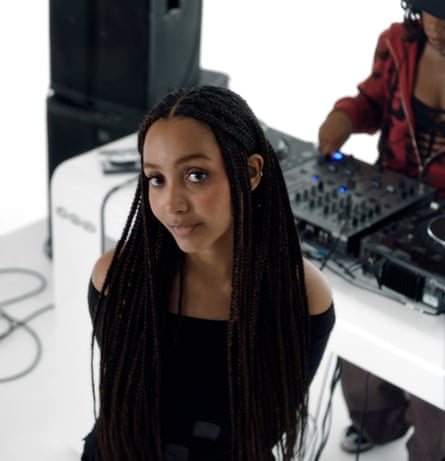A good music producer facilitates a studio environment that allows an artist to plunge into the depths of their soul, and cleverly shapes the sound of their music – a bad one, meanwhile, can halt a promising career. But in 2023, 70 years on from the dawn of rock’n’roll, this tremendous power still lies in the hands of an overwhelming majority of men.
Women and non-binary people claimed less than 5% of producer and engineer credits across the top 50 streamed songs of last year, according to a recent report from Fix the Mix. Dated stereotypes have framed producing as the preserve of nerdish knob-twiddling blokes – despite there being ample historic evidence to the contrary.
The meticulous and patient work of Susan Rogers is legendary, engineering Prince records at the height of his career when studio sessions could last for days on end. Kate Bush self-produced Hounds of Love, regularly voted one of the best albums of all time for its arresting sound. Sylvia Massy has worked as an engineer and producer on music from some of the most successful rock acts of all time, including Tool, System of a Down, Skunk Anansie and Red Hot Chili Peppers. Artists including Beyoncé, Taylor Swift, Janelle Monáe, Alison Goldfrapp and Grimes are just a few in a long list of women to have production credits on their own albums.
Catherine Marks, who co-produced the recent UK No 1 debut from indie supergroup Boygenius and has worked in the industry for 17 years, says the lack of diversity is due to a ceiling that inhibits progression. “Since I started, there have been more women coming through at entry level but there’s no support,” she says. “There’s still a perception issue that impacts their ability to find management and get introduced to decision makers in the industry.”
For those who do manage to reach a professional level, a lack of imagination from music executives and artists when it comes to choosing who to work with results in what producer Marta Salogni, who has worked with Björk, MIA and Bon Iver, calls a vicious circle: “It feels safer sometimes for gatekeepers to employ the same people but if women are not being employed, they can’t build up the credits that would make sure they can be employed.”
Hiring and championing a new producer who doesn’t yet have a robust track record might be seen as risky, but as Marks puts it, “stepping into the studio is always a risk because anything can happen”. Also, studio trials are commonplace, where artists and producers have a chance to see if they get on before officially working together. “I know some of the biggest names in the industry who are still having to do that now,” she says. “I don’t see why those opportunities can’t go to different people.”
A&R and marketing executive Jane Third, who has worked with self-producing acts including Rina Sawayama, says all-female sessions can be less hierarchical. “Women are maybe a bit more open and collaborative; there’s more freedom of expression. It can feel a bit more flat, where everyone is contributing equally, in comparison to other scenarios I’ve been in.”
Does this lack of equality affect the very sound of pop? It’s interesting to consider what Raye’s sparsely produced debut might have sounded like if she hadn’t exited her major label deal before it was released and therefore had less control in the studio. The album hit No 2 in the UK earlier this year and was widely praised for being eclectic and bold. Her back catalogue of dance-leaning pop hits (produced by men) suggests it could have been quite different. Ultimately, more diversity in the studio will result in more diverse music, as Salogni says: “A male-dominated team does not reflect how multifaceted society is. What might [more diversity] in production sound like? I think that’s all to discover.”
Having a wider choice of producers to work with will also probably result in fewer female acts being faced with predatory behaviour, as Ellie Goulding experienced as a 19-year-old desperate to make it. In an interview with the Guardian, she said: “My whole career started off with instantly being made to feel like a sexual object, and being made to feel vulnerable in those sessions. And there are so many female singers that will hear me saying that and say: ‘Yeah, I can relate.’” Raye sings about a predatory producer on her track Ice Cream Man, “tryna touch me, tryna fuck me, I’m not playing / I should’ve left that place as soon as I walked in it”.

Producer Catherine Anne Davies, who also performs as the Anchoress, says she gets a lot of her work from women who haven’t had positive experiences in the studio and are looking for a different dynamic. “I don’t think women who produce have a different sound but I do think it impacts on the psychology of a space,” she says. “A big part of your role as a producer is, essentially, being a therapist, which is all about getting everyone to feel comfortable enough to open yourself up completely.”
She cites research by a master’s student she has supervised that looked at “accessing vulnerability and how that changed, depending on if they were in co-writing sessions with men or with women, and having what they call ‘keep your shoes on moments’ in the studio in case you need to leave suddenly because something dodgy happens.” If a male producer behaves inappropriately or in an overbearing way, or if that has happened to an artist in the past, “it’s going to have an impact on the music created because you don’t feel comfortable enough to be vulnerable”.
There is evidence of change. Women currently make up 18% of members at the Music Producers Guild – up from 5% in 2016 – and its board has three women directors out of five. Technology has also somewhat levelled the field, especially for producers with parenting responsibilities who have difficulty committing to the long hours expected in studios billing by the day. (Marks, who doesn’t have children, says she’s often in the studio until 10pm and feels that she’s made personal sacrifices for work.)

This will also play a role in a rising number of self-producing acts – PinkPantheress gained traction after posting clips of songs she had recorded herself in her university dorm room on TikTok, and Griff secured a record deal after sharing her self-produced songs online. It remains to be seen whether they’ll also produce for others as male artists often do (such as Joel Corry, Mura Masa and Digital Farm Animals in the dance pop field alone).
The major labels and music publishers point to various initiatives: panel talks and masterclasses for female engineers and producers; research reports; campaigns; non-profit initiatives; all-female songwriting camps and deals with self-producing female acts. Still, Laura Lewis-Paul, who heads up non-profit music tech initiative Saffron, which last year had 178 women graduate through its music tech courses for beginners (out of 645 applicants), would like to see greater collaboration between the music industry and initiatives like hers, which has recently lost its funding. “At the moment, people are very willing to talk and discuss the issues but they’re not necessarily looking at how to make changes.”
Lewis-Paul says that upon leaving the course, graduates “are faced with an industry or an educational setting that isn’t necessarily ready for them; they feel like they don’t belong in that space.” This can be especially true for those who are ethnically diverse: 0.7% of production credits went to women of colour across 1,100 popular songs from 2012 to 2022, according to research from the Annenberg Inclusion Initiative in the US. Lewis-Paul continues: “We need to look at their journeys and how to create opportunities for them, with strategic partners.”
For Marks, support from power players in the music business for new producers is crucial. “I’ve had a lot of support. I got management quite early on and I had the support of mentors who were very well known and successful in the industry who were championing me. We need more of those kinds of people. This isn’t about a lack of women being interested, willing to work hard or having the right kind of personality to work in this industry. It’s about encouraging them all to come through.”

